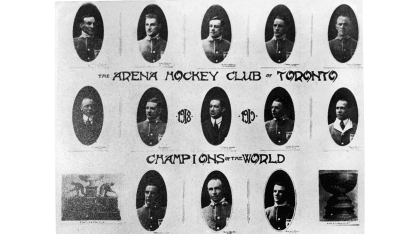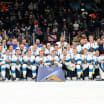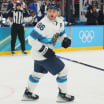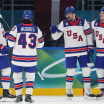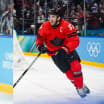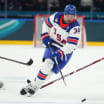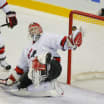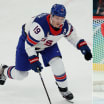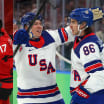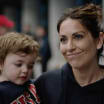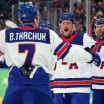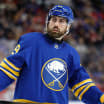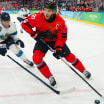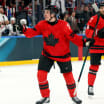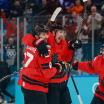Legendary hockey reporter Stan Fischler writes a weekly scrapbook for NHL.com. Fischler, known as "The Hockey Maven," shares his humor and insight with readers each Wednesday.
With the Toronto Maple Leafs among the Stanley Cup contenders this season, Fischler documents the 106th anniversary of the Toronto Arenas winning their first NHL championship.
Will this be the year when Toronto celebrates its first Stanley Cup championship since 1967? We'll know the answer by the conclusion of the Stanley Cup Playoffs.
While Maple Leaf Nation hopes for the best, Toronto fans should be reminded that Canada's Queen City boasted the NHL's first Stanley Cup winner March 30, 1918, eight months before the end of World War I.
Technically called The Arena Hockey Club of Toronto -- or simply the Arenas, Blue Shirts or just Blues -- the new franchise played home games in a five-year-old downtown hockey palace. It was called the Mutual Street Arena and, by allowing standing room, it could hold 7,500 spectators.
"At the time," said Toronto hockey historian Kevin Shea, "it was the largest, most modern indoor rink in Canada, although the seats -- long painted planks -- left a little to be desired."
Torontonians took a liking to the team managed by hard-nosed Charlie Querrie. who I consider a "Conn Smythe facsimile" before Smythe became owner of the Maple Leafs in 1927.
"It was clear from the outset," Shea said, "that Querrie would be calling the shots."
At the team's first practice, Querrie laid down the law.
"First and foremost," he said, "don't forget that I'm running this club. It won't do you any good to tell your troubles to the public and the other players. If you have a grievance, tell me."
Querrie's lineup was sprinkled with future Hockey Hall of Famers including Reg Noble and Harry Cameron and the brother act of Cy and Corbett Denneny. At one point during the season, Querrie fined Nobel and Cameron $100 each for "breaking training."
The NHL split its inaugural season in half with each team playing a total of 14 games in the first segment. The Arenas (8-6-0) finished second behind the first place Montreal Canadiens (10-4-0).
Meanwhile, Querrie fortified the Arenas on the fly. On Jan. 4, 1918, he remedied his goaltending issues by signing former Seattle Metropolitans star Hap Holmes and added a forward, Jack Adams, who later would become mastermind of the Detroit Red Wings.
The additions paid off in the second half. The Arenas finished first (5-3-0) ahead of Ottawa (4-4-0) and last place Montreal (3-5-0). When the playoffs began the winners of the first half played the second half leaders.
The road to the Stanley Cup began with the Arenas challenging the Canadiens in a two-game total-goals series starting at Mutual Street Arena on March 11 and then Montreal's Jubilee Rink on March 13, 1918. The Arenas won the two-game opening tournament by a goal total of 10-7.
To win the Stanley Cup, the NHL champions had to play the Pacific Coast Hockey Association's winner. The Vancouver Millionaires won by defeating the Metropolitans 3-2 in the total-goal series.
"The Millionaires are out to win the Cup," wrote the Vancouver World, "and if confidence counts for anything they will be world's champions."
The best-of-5 series would be played at Mutual Street Arena beginning March 20, 1918, with two different sets of rules. The PCHA featured a seven-man game including a "rover" and allowed forward passing in the neutral zone.
By contrast, the NHL forbade forward passing anywhere on the ice. That meant the League rules would be altered game by game.
"No visiting team had yet to win the Stanley Cup under this arrangement," reported Toronto hockey historian Eric Zweig.
True to form, Toronto took advantage of the rule, and home ice, to defeat Vancouver 5-3. The second game, played under PCHA regulations, was a different story. According to the NHL's unofficial history, "The Trail of the Stanley Cup" authored by Charles L Coleman, "Toronto appeared at sea with the forward pass."
Vancouver tied the series with a 6-4 victory in a nasty game when Fred "Cyclone" Taylor scored two goals. His clever playmaking had one newsman praising him as a "passing magician." But referee Art Ross, later to become the first coach and general manager of the Boston Bruins, ignited controversy after the game with a caustic critique of the losers.
Ross infuriated Toronto fans by telling reporters that "the Blues gave a most brutal exhibition."
"Toronto fans gave Art a rough ride when he returned a few nights later," wrote Zweig in his biography of Ross.
Taylor again led the Millionaires in Game 3 with two goals, but Toronto won 6-3. Then came the series stunner and what many reporters thought would enable Vancouver to win the Cup. They won 8-1 in Game 4 and, according to Coleman, "skated their opponents dizzy."
On the morning of March 30, 1918, the Toronto Daily Star expressed concern shared by the fans in Canada's second largest city.
"The Blue Shirts should have a big advantage playing the Final under their own rules, but they made such a sorry showing Thursday that the Vancouver challengers must be granted much more than a fighting chance to win."
In a classic finish to the NHL's first Stanley Cup battle, the teams fought through two scoreless periods. Finally, Taylor beat Holmes from close range and for a few moments it appeared that Vancouver goalie Hugh Lehman would blank the Arenas until Toronto's Alf Skinner beat Lehman 30 seconds into the third for a 1-0 lead and now it was anybody's game. According to Coleman, "The westerners then began to wilt," and spurred by the Arena crowd, the home skaters increased the pressure.
In the end, youth prevailed. Arenas forward Corbett Denneny still had the stamina and speed to display the best individual effort of the night, beating Lehman at 10:30 for an eventual 2-1 win that gave the Arenas the NHL's first Stanley Cup title.
Summing up its post-series review, The Toronto Daily Star concluded: "Outside of Denneny's great effort, the outstanding feature was the marvelous work of Harry Holmes and Hugh Lehman, the rival goalkeepers. No better exhibition of goaltending has ever been seen in Toronto. They were both wizards."
P.S. Just for the record, Holmes was awarded $700 for his playoff histrionics while Cup-winning hero Corbett Denneny was tickled to receive a $550 check for a job well done!
